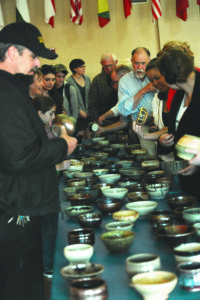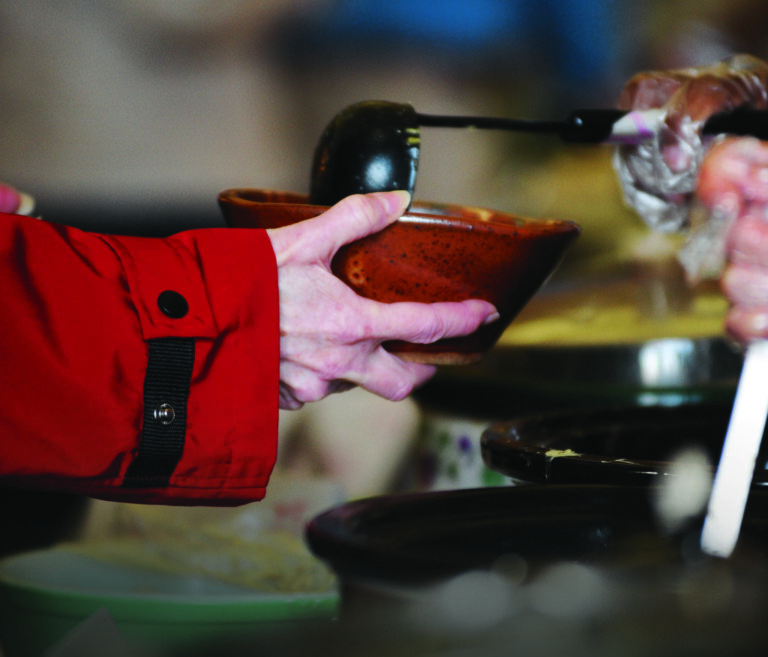At the very heart of Berea, one finds two commitments, one to the Christian faith and the other to the dignity and utility of labor. These Commitments, individually essential, mutually reinforce one another as well, uniting beautifully in the theme of this issue “Love of Work and Works of Love.”
Our Third Commitment, the Christian Commitment, says that Berea College works:
To stimulate understanding of the Christian faith and its many expressions and to emphasize the Christian ethic and the motive of service to others.

Though crucial to Berea’s identity, this Commitment has been a challenge for us, and has resulted in careful study a number of times in our history. Even with that attention and effort, questions and tensions remain. Why do some students perceive Berea College to be untrue to its Christian principles? Why do others think there is too much emphasis on religion and spirituality? Why do some alumni worry that the College is not standing firm in its historic Christian identity? How do we create a community where people of other faiths, or no faith, are affirmed and supported? And why should we “stimulate understanding of the Christian faith,” if we are also welcoming to those of other faiths? After all, we do welcome everyone—believing “God has made of one blood all peoples of the earth” (Acts 17:26), compels an inclusive environment. I happen to be a Christian, and have always enjoyed discussing my faith with those who are curious about my understanding of it, but I am aware that those who have embraced other belief systems feel the same.
At a Convocation in 2013, Appalachian author Ron Rash quoted the southern writer Eudora Welty, who said memorably, “One place understood helps us understand all other places better.” This observation works for religion and spirituality, too. Understanding one religion in-depth, enables one to understand all religions better. I would also argue that whatever our faith perspectives, we can likely agree that, like it or not, religion and spirituality are extremely important in human affairs. Failing to grasp that is to miss a phenomenon that powerfully drives history and politics, as it profoundly shapes people.
It is through deep understanding of the Christian faith that we can come to realize that the best form of community is not one where the adherents of a particular perspective merely tolerate those of other perspectives. Rather the full value of the Third Great Commitment is only realized when members of the community engage, respectfully and with interest, across religious boundaries, learning deeply from one another.
Just as our Third Commitment is essential to works of love, our Labor Program is also essential to developing a love of work. Our Fourth Commitment is:
To provide for all students through the labor program experiences for learning and serving in community, and to demonstrate that labor, mental and manual, has dignity as well as utility.
Three years ago, when I came to Berea to interview for my current position, I was taken on a campus tour. As we visited the music building, Presser Hall, I noticed a student pushing a cleaning cart out of a restroom. He carried himself with dignity and showed satisfaction in having completed the work of tending to that restroom. Watching this young man, I had an epiphany of sorts. He had likely gained experiential learning about the kind of manual work that goes into maintaining our spaces, but I realized that it wasn’t just those who use that restroom who were the beneficiaries of his participation in the Labor Program. Other students doing their own work and seeing a peer cleaning the bathroom likely attach more value and significance to that clean bathroom, too. True, some students work at other colleges and universities, but it is not at all the same thing as when the entire student body shares the experience of contributing to the school through their work. When you think of all the college students in our country who do not learn the lessons of appreciating their own work as well as the work of others, it should actually bother you. Work is important.
 I have also learned a great deal about the Labor Program through conversations with current students. While many may have had some reservations about the program as incoming students, I find that somewhere along the way they begin to see the value of the work and to understand that work has contributed crucially to their college experience. Berea students mostly come to us with strong work ethics, but a lot of polishing and refining of those work ethics occurs via the attention of labor supervisors. At Berea College we have many fine teachers in the classroom, but a lot of teaching occurs outside of the classroom as well. Our students learn great lessons and form meaningful bonds with their supervisors.
I have also learned a great deal about the Labor Program through conversations with current students. While many may have had some reservations about the program as incoming students, I find that somewhere along the way they begin to see the value of the work and to understand that work has contributed crucially to their college experience. Berea students mostly come to us with strong work ethics, but a lot of polishing and refining of those work ethics occurs via the attention of labor supervisors. At Berea College we have many fine teachers in the classroom, but a lot of teaching occurs outside of the classroom as well. Our students learn great lessons and form meaningful bonds with their supervisors.
When I meet Berea alumni, I am in the habit of asking about their labor experience. Almost to a person, they enthusiastically value having worked and what it gave them, and alumni also often cite great personal and professional advantages from their labor experiences at Berea. One alum mentioned that he had overslept once and did not arrive at the Boone Tavern kitchen at 4 a.m. to make the nests for the signature menu item, Chicken Flakes in a Bird’s Nest, for the redoubtable Richard Hougen. The alum further shared that he has never ever been late for work again! On another occasion a Trustee told me she learned from her first-year labor assignment in Weaving that she should not do anything that involved working with her hands, and fortunately she found other things she was very good at. And I think of a successful executive running the IT operation of a major international firm who got his start in our IS&S division in the early days of computers here. He remembers being excused from class to fix a glitch that had occurred in the faculty payroll because he had written the software application that ran it. Very likely every alum reading this column could add an interesting story!
While the Third and Fourth Commitments go hand in hand for all students, this connection might be the richest for one group of students in the Labor Program-—the student chaplains. These 16 students work under the direction of the Willis D. Weatherford, Jr. Campus Christian Center in the student residence halls and wherever else on campus they are needed. These chaplains are led by coordinators, themselves student chaplains. Mark Ross and Landon Beaver, our two wonderful Coordinators from last academic year, were both kind enough to reflect on how the third and fourth Commitments impact their experiences at Berea.
Both Mark and Landon expressed to me a strong sense of gratitude for having the opportunity to learn and grow through serving as chaplains. As Mark put it, “the idea of Christian service . . . is expressed in its truest form in the student chaplain program . . . I truly saw that I was making a difference in the lives of those around me.” Chaplains develop skills in conflict management, grief counseling, and peer counseling that will be “useful for life after Berea,” said Landon. This combination of practical experience and service to others is what led Landon to call his labor position, “the best job on campus.”
Like many of our students, Mark and Landon exemplify the ideal of loving the work they do in sharing works of love.
Put another way, Berea students learn that the reward for work well done is much more than a paycheck and that examination of your own and others religious beliefs deepens your faith and opens you to many spiritual gifts. Truly, these two Commitments are at the very heart of the Berea experience.


